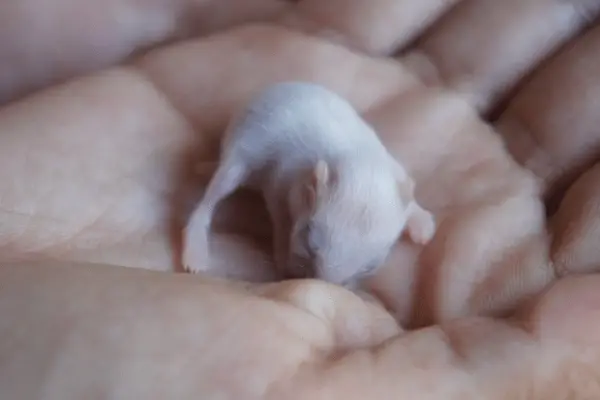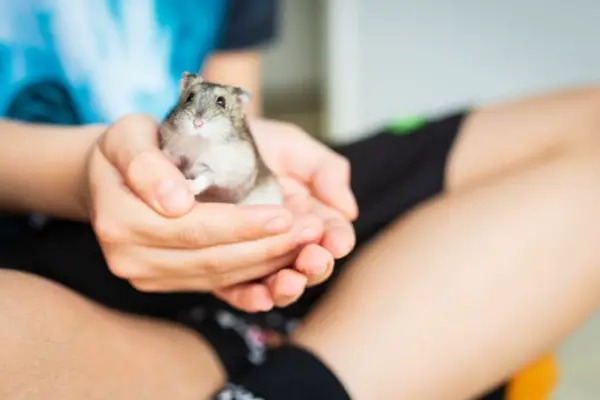How Long Do Hamsters Sleep (6 Things To Consider)

How long do hamsters sleep is a common question among hamster owners and that is exactly what we will be discussing in this post!
Hamsters sleep in a set of times, this means they can sometimes sleep up to 3 times during the day.
This might be a little difficult to measure because there are many factors that influence how long a hamster sleeps.
We will discuss these factors and I will give you my final answer on how long a hamster sleeps, so keep reading.
How Long Do Hamsters Sleep
Hamsters have polyphasic sleep-wake rhythms, which means they can sleep numerous times a day in short portions throughout the day. However, a healthy hamster will sleep between seven and nine hours each day on average.
The number of times a hamster sleeps a day can be influenced by a number of factors.
Whatever be the case, you shouldn’t expect your hamster to sleep for seven to nine hours in a row.
Sometimes this is hard to measure because hamsters sleep during the day while you are away and stay active at night while you sleep.
So, let’s look at some common factors that influence how long a hamster sleeps.
Note: some hamsters do stay active during the day and can sleep at night, although this is not normal, it still happens.
Factors that influence how long a hamster sleeps
Here are some common factors that affect how long a hamster sleeps:
1. Overall health of the hamster
The overall health and well-being of a hamster directly affect how long such a hamster can sleep.
Hamsters are faced with lots of health challenges that can directly affect how long they sleep.
For example, a hamster with a wet tail may have issues sleeping as they are faced with diarrhea which directly affects their sleeping cycle.
When a hamster is healthy that is the only time you expect to see a normal hamster sleeping cycle.
2. Lightning of the hamster room
As funny as it may sound hamsters don’t enjoy sleeping in areas there is high light sensitivity.
When your hamster cage is positioned in a place it receives direct sunlight, then be rest assured it will affect your hamster’s sleeping cycle.
Hamsters don’t enjoy sleeping under direct and bright light, so make sure you place your hamster cage in areas of your house without direct or bright lights.
3. Level of noise around the hamster
The level of noise around your house cage doesn’t only affect your hamster’s sleeping cycle but also causes high-level stress.
Hamsters don’t sleep well in a noisy environment even in the wild they dig to a point that is away from the noise.
So, the more your hamster cage area is noisy the more you distort your hamster’s sleeping cycle.
4. The age of the hamster
This is an important factor that influences the sleeping cycle of a hamster.
A younger hamster may follow a certain sleeping cycle, but as they grow older their sleeping cycle changes.
A hamster that is becoming older will not spend as much time on his exercise wheel or sprinting about his cage as he once did.
This decrease in activity will be accompanied by an increase in the amount of time he spends sleeping; you’ll notice that he gets up later in the day and goes to bed earlier.
5. Type of food the hamster eat
If you keep giving your hamster foods that make them uncomfortable then you should expect to see changes in their sleeping cycle.
Some foods are difficult to digest by hamsters and can become stressful, so always make your research or consult your veterinarian.
6. The level of trust the hamster has for the owner
As funny as it may sound hamsters trust their owners to the point they are free to sleep anywhere in their cage.
Hamsters are prey to many animals which is why it is hard to see hamsters in the wild during the day.
In captivity, hamsters learn to trust their owners and this goes a long way to affect their sleeping cycle.
A hamster that doesn’t trust its owners is always alert looking for ways to escape, this will cause more stress for the hamster.
And a stressed hamster finds it hard to feel relaxed which also affects its sleeping cycle.
How to help a hamster get good sleep
Here are some common ways to help a hamster get the required sleep:
- Place your hamster’s cage in a dark where the hamster can sleep comfortably.
- Place your hamster’s cage in a quiet area to avoid unnecessary noise.
- Play with your hamster to exhaust their energy level before leaving home.
- Your slow and not harsh voice and the activity will bring your hamster out of her slumber.
- Learn your hamster’s timetable and prepare to handle and play with her while she is awake.
- If you need to wake up your hamster, speak calmly to her while changing her food and water.
- Cage cleaning, feeding, and handling should all be done in the late afternoon or evening.
- Make a pleasant contained area for your hamster to sleep in, such as a tiny box or a clay pot turned on its side.
- To gratify your hamster’s natural need to burrow and make nests, provide clean, fresh bedding.
- Choose absorbent bedding materials that are comparable to what your hamster would use in the wild.
- If necessary, wake your hamster at the same time every day to help her establish a routine.
Do hamsters sleep more in winter?
Yes, hamsters sleep more in the winter, this is because winter is the coldest season of the year that provide a more comfortable environment for hamsters to sleep.
Even though most hamsters sleep more during winter, some hamsters do go about their daily activities irrespective of winter.
Do hamsters sleep all day?
No, hamsters in captivity don’t sleep all day as they have polyphasic sleep-wake rhythms, which means they can sleep numerous times a day in short portions throughout the day.
Hamsters break up their hours of sleep and do not sleep all day long.
When do hamsters sleep
Generally, hamsters in captivity and in the wild sleep during the days and are active at night as there are fewer predators at night, making them safer at night in wild.
In some cases, hamsters do sleep at night, but majorities of the time they sleep during the day.
Do hamsters sleep at night?
These little rodents, such as hamsters, prefer to stay awake in the dark because they feel secure from predators at night. Because hamsters are nocturnal, it’s only natural that they don’t sleep at night.
Here are some common reasons why hamsters sleep at night.






